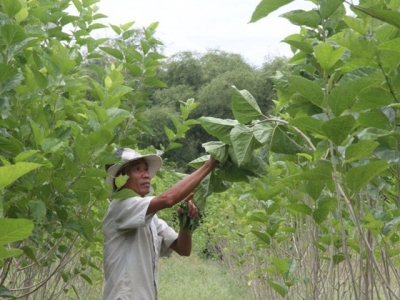US company announces plan to invest $50mn in GM silkworms in central Vietnam

The firm’s project is expected to revive the region’s dying sericulture industry
A farmer checks a mulberry in his field in Quang Nam Province, Vietnam. Photo: Tuoi Tre
An American biotechnology company has unveiled its proposal to invest US$50 million in the rearing of genetically modified silkworms in a central Vietnamese province historically known for its silk farming.
Kraig Biocraft Laboratories hopes to bring its genetically engineered silkworms from the U.S. to Quang Nam Province and create hybrids between the newcomers and native species to heed the company’s ambition to produce higher-quality silk.
The enterprise had successfully experimented with the hybrids at home and found that their fiber was much more elastic than steel fibers and stronger than synthetic ones, according to Jon Rice, the company’s CEO.
Quang Nam was selected for the region’s already experienced sericulture workforce and infrastructure, as well as its historical connections to silk farming, Rice told Tuoi Tre (Youth) newspaper.
“Collaboration with local farmers and workers, leveraging their expertise and knowledge, is core to our production scale-up efforts,” Kraig Biocraft Laboratories’ website quoted Rice.

A farmer holds a basket of silkworms at his house in Quang Nam Province, Vietnam. Photo: Tuoi Tre
Kraig Biocraft is currently in the process of preparing the legal documents necessary to carry out the project, including the paperwork needed to break ground on a silkworm research laboratory for farming and production on a 50-hectare piece of land in Quang Nam with future plans to expand to 2,000-2,500 hectares.
The company expects to purchase cocoons from silkworms that farmers cultivate at the complex and use the silk to make products for domestic and international consumption.
A major stumbling block to Kraig Biocraft Laboratories is that it has to obtain a certificate from the American authorities proving that the genetically engineered silkworms pose no harm to local species.
The project also raises hopes that the province’s sericulture will once again rise to prominence.
Có thể bạn quan tâm
 Raw material shortage, low prices stifle cashew industry
Raw material shortage, low prices stifle cashew industry Input shortage and unhealthy competition cause many cashew factories to suspend operation.
 Vietnamese lychees exported to Malaysia lure consumers
Vietnamese lychees exported to Malaysia lure consumers The first container of the 2018 Vietnamese lychee crop arrived in Malaysia on July 2 and was warmly welcomed by Malaysian consumers.
 Vietnam’s rice exports to Malaysia surge in first five months
Vietnam’s rice exports to Malaysia surge in first five months The value of Vietnam’s rice exports to Malaysia soared by 177% to an estimated US$122.4 million in the first five months of 2018